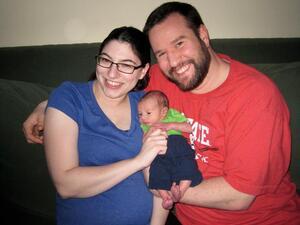Be Fruitful and Recognize
Despite being a Jewish educator, I have never felt a strong, personal connection to our sacred texts. I read the Tanakh as one reads literature, though I found that this particular series of books has way too many underdeveloped characters and a plot that is only loosely held together. It certainly didn't invoke the kind of emotions that, for example, the Harry Potter books did. These stories were never my story.
Last year, I took a course in Hebrew Bible at a local university, as a refresher to better my own teaching of the topic. And I saw myself everywhere in those texts. Reflected back at me like a mirror, she appeared over and over: the barren woman. Sarah. Rebecca. My namesake, Rachel. In Psalms. As a metaphor used by the Prophets. Samson's unnamed mother. And, of course, Hannah.
These women knew my struggle. They knew my pain, my anger, and my desperation. They felt the burden of disappointing their husbands, of not being a "good wife." They understood that, beyond the deep longing for a child to complete their own family, lay a sense of personal obligation to bring into the world the next generation of Jews.
The stigma attached to these women, particularly the early matriarchs, scared me. While I wasn't about to offer my husband another woman to procreate with, I found the text telling me that my worth as a woman, and my husband's love, depended on my ability to bear his children. Furthermore, they became increasingly bitter and jealous of the more fertile women around them. I felt that same envy building up in myself with the passing of each fruitless month.
Shouldn't I be finding comfort in these words? Isn't our religious tradition supposed to lift us up at times like these? What could I possibly learn from these women? I took a step back, trying to see the big picture. Infertility was a common motif throughout the Tanakh, which suddenly meant something to me: it was normal. I was not alone. My ancestors did not struggle in silence; they expressed their emotions openly throughout the text, and I could do the same.
So I began sharing my story with other women, in person and through social media. And I found an entire network that shared my fears and desires, experienced the same side effects from the fertility drugs, and compared notes on the best ovulation monitors. And, like my ancestors, I prayed with my whole heart. For the first time in my adult life, I spoke to God, plainly and pleadingly. In particular, Hannah's story—an infertile woman who prayed so passionately for a son that she appeared drunk—became my story. I finally found myself in the Tanakh.
It still frustrates me that all of the barren women in the Bible eventually become pregnant, as if a heavenly miracle is the only acceptable conclusion to infertility. My network of strong, infertile women have found their own paths, whether through science, adoption, or acceptance. And some, like me, managed to find some solace along the way by reading the same texts we have read since childhood, finding resonance in those ancient words.
My story ended in a similar fashion to Hannah's. Thanks to a combination of fertility drugs and artificial insemination, I gave birth to a beautiful baby boy. Like Hannah, I thanked God: "This is the son for whom I have prayed."






